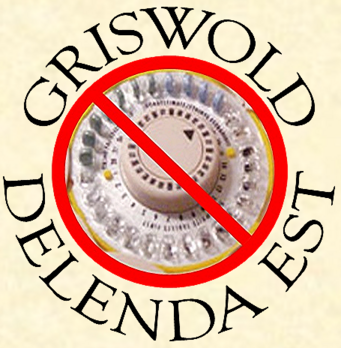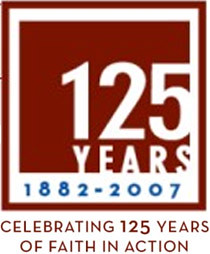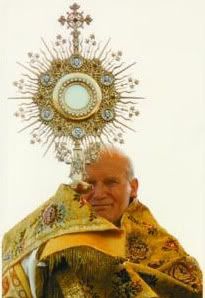Where have all the men gone?
I just came from a "retreat" for first Communicants (really just a practice), and I spent most of it shaking my head. Lesson One: you don't give second graders choices, you tell them to do something. So that means, when you tell them to fold their hands when processing, tell them to do it in a particular way, not just "in a prayerful position." Heck, I'm not sure I know what that sort of liturgese is supposed to mean.
Lesson Two: don't place sacred vessels on the ground, even if they contain unconsecrated species. I don't know why this needs explaining.
Lesson Three: Nothing that goes on in a Sacrament or in the Mass is done because "people want to see you" or so that you can "look nice." You fold your hands and walk slowly and act in a reverent manner because YOU'RE IN CHURCH and because you're about to receive THE BODY, BLOOD, SOUL, AND DIVINITY OF THE INCARNATE SON OF GOD. For the love of everything sacred, something has to be done to counteract the urge to make our liturgy a self-absorbed celebration of how pretty we all look and how special we all are. Of all the things that are important in the Mass, you and I are not very high on the list.
Lesson Four: What sort of example does it set for a gaggle of small children if you, as a teacher and an adult, take off your shoes and wander around the church barefoot? What on earth makes you think that this is an appropriate thing to do in any sense of the word? What on earth makes you think that this is a good thing to portray to children as "ok"?
Lesson Five: The USCCB (uhm, well, somebody) should send every Catholic adult in this country a book of basic Catholic vocabulary. That thing the priest stands at is an altar, not a table. Therefore, the thing that covers it is an altar cloth, not a table cloth. Holy cards, rosaries, and the like are sacramentals, not items.
Lesson Six: Learn the norms that govern what you're teaching. If you don't, you'll tell little children things that are wrong. For instance, don't tell children to chew the Sacred Host. Why? Because doing so is not permitted. Don't tell the children they can just touch the Precious Blood to their lips. Why? Because you actually have to swallow it in order to receive.
Lesson Seven: Keep your modernism to yourself. We had a little girl from an orthodox, traditional family who was bullied by her teachers into not wanting to receive on the tongue because "we'd really like it if you received in the hand." Give me a cotton-picking break.
If you're orthodox and informed and not teaching catechesis, why? Go to your parish, right now, and sign up. There's a clueless heterodox ninny there who needs replacing.
File Under: The_Liturgy








7 Comments:
on chewing the host, see this.
It would be helpful if catechists taught kids not to chew gum during Mass.
Uhm, ok, I would have sworn that there was actually a rule against chewing, that it was in the Catechism of Pius X (it's not -- all I can find are vague references to pre-V II disciplines). So, I should clarify: they shouldn't tell children to chew the sacred host because it conflates the sacrament with ordinary food and implicitly diminishes faith in the real presence. It does not appear to be prohibited -- but that doesn't make it a good idea.
And yes, teaching them not to chew gum would be good . . . that's one of those things that should be so stupidly obvious, yet isn't.
heh - I've been there too. Some other (non-official) opinions: 1. chewing insults or attempts to injure Jesus; 2. allowing the host to disolve means that one never swallows the host and thus, never receives Jesus.
I think nuns introduced the no chewing rule to prevent kids from chomping with their mouths open (just as current catechists teach kids to merely touch the cup to their lips to prevent gulping). This kind of teaching is short on ontology and long on pragmatism.
it conflates the sacrament with ordinary food
This is not so bad. As a sacrament, Holy Communion should have the appearance of bread (or matzo) as part of its symbolism: Jesus is our food. To the senses, Communion does (and should) look and taste like ordinary food. Faith informs us of the profound gift concealed by our senses (I'm drawing on the Tantum Ergo, here).
Real Presence (like the Incarnation) requires faith - changing the appearance would obviate or delay the reliance on faith - why else did Jesus come among us incognito and not walk around in blinding glory? had He done so, nobody would need faith.
What do you think?
"One unfortunate 'custom' which I have encountered frequently in my priestly experience is the idea implanted into little children that it would be terribly wrong and even sinful if they ever touched the Sacred Host with their teeth while receiving Communion. This erroneous conviction has caused many children to be frightened when they approach the Holy Eucharist. Actually, the Apostles on Holy Thursday chewed and ate the Holy Sacrament in the natural way. The Church has never declared that the use of the teeth is sinful or wrong. Many priests chew the large Host in Holy Communion, eating it just as the Apostles did.
"It is true, we do not usually chew the small Host. The reason, however, is not that it would be sinful, but that it is not necessary. Parents and nuns should explain this to the children and assure them that it is perfectly all right if for some reason they should hold or touch the Host with their teeth."
(Excerpted from "Religious Customs in the Family," Fr. Francis X. Weiser, S.J., TAN Publishers, Rockford, 1998 [BUT original copyright year is 1956])
I am orthodox and orthopraxic. I consider it my duty to be a catechist. It's entirely useless to sit around and constantly complain about how bad things are if you never do anything about it. I have been guilty of this, and am still guilty for not actually trying to aquire a degree in theology. If you have an advanced degree and are interested in theology, you should get the credentials and teach in the college/university setting. That is where the some fidelity needs to be reintroduced. How about actually making the maundatum a requirement? How about firing all the heterodox secularist liberals and conservatives and replace them with men and women who are faithful to the teachings of the Church and the Magesterium?
Father - I've heard reference to the "prohibition" against even touching the Host with the teeth, but have not propogated it. I thought of not chewing (even when I was under the misapprehension that it was required) not so much as a moral necessity but, as Fred alluded to, more of a disciplinary practicality: it precludes chomping or getting parts of the Host stuck in the teeth, and, in a subtle way, reinforces for children the point that the Eucharist is different from other things we eat. Obviously priest is also in a different position, especially as the Host he consumes is much larger. Is it wrong, then, to tell small children not to chew, as long as you don't threaten them with hellfire as a consequence?
As for conflating the Eucharist with ordinary food, I think you can only take that so far. Yes, the existence of the Eucharist under the species of foodstuffs, and Its consumption as food are integral to the nature of the sacrament; looks like food, tastes like food, smells, etc. like food -- without a doubt and most rightly so. But the apt (and from a practical standpoint necessary) appearances of the Sacrament should not lead us to think of or treat It as ordinary food. Consider the prohibition against the presence/distribution of ordinary food during the Mass: having regular food in the same setting as our spiritual and divine food conflates the two, and leads to confusion. Our practices and catechesis should reflect our need for the Blessed Sacrament as spiritual nourishment while discouraging attitudes that lead to the "normalizing" of the Eucharist as just another consumable thing that we eat. If it truly our most special and glorious food, it by definition cannot be ordinary.
I guess my main beef isn't that the children are or are not taught to do one or the other particular thing in most cases, but that the catechesis lacks, in this case, any coherant theme or attitude of reverence for the Blessed Sacrament. You have to do more than say "this is Jesus." You have to act like you really believe it. And a lot of people just don't sound or look like they do. When it comes down to it, that, I think, is the problem.
Pyro - from your keyboard to God's ear.
I just found your blog from a link in the comments box on the Shrine of the Holy Whapping. Very interesting post on "where have all the men gone" which sent me off on a tangent of my own and even caused me to resurrect my own blog. Now see what you've started :-)
Anyway, just wanted to say thanks for site, it's refreshing!
In Domino,
Post a Comment
<< Home